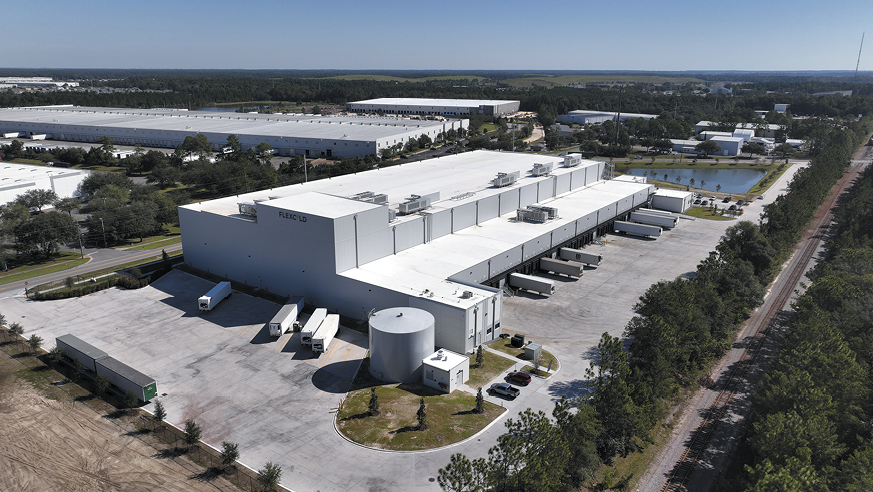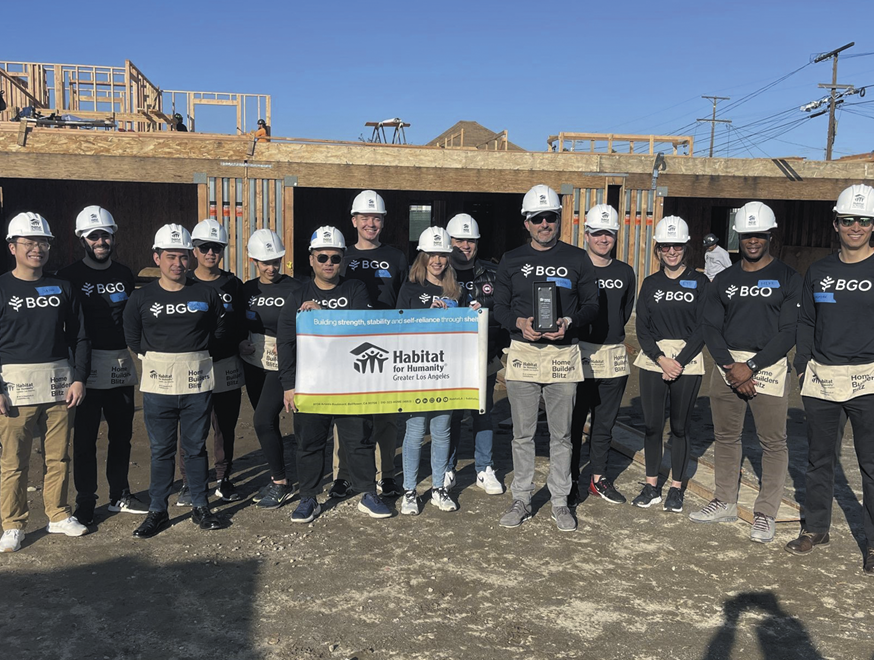- Home
- Media Kit
- MediaJet
- Current Issue
- Past Issues
- Ad Specs-Submission
- Reprints (PDF)
- Photo Specifications (PDF)
- Contact Us
- PRIVACY POLICY
- TERMS OF USE
![]()
ONLINE
![]()
ONLINE

Trusted Stewards
Of Capital
Editors’ Note
John Carrafiell is the Co-Chief Executive Officer and a Board member of BGO. He has oversight responsibility for BGO’s global business activity with particular responsibilities for the firm’s U.S., European, and U.K. businesses and is a member of the firm’s Investment Committees globally. Carrafiell was a Founder of GreenOak Real Estate in 2010 and, together with the team, built the business organically to $12 billion of AUM in 10 countries prior to its 2019 merger with Bentall Kennedy. Carrafiell is a 37-year private equity, corporate finance, and real estate veteran. He became Head of European Real Estate for Morgan Stanley in 1994 and over the course of a 22-year career ascended to be Global co-Head of Real Estate. He also served as a member of the six-person Global Operating Committee of Morgan Stanley’s Investment Banking Division from 2005-2007. Carrafiell is a member of multiple outside company boards including Lineage, the world’s largest cold storage company where he is also a member of the Compensation Committee; Bulk Infrastructure, a leading European green energy data center company; Klepierre, a leading publicly-listed European REIT where he also chairs the Audit Committee; and Sandow Lakes Ranch, LLC, which owns a 32,000-acre master-planned mixed-use development community. Carrafiell holds a BA degree from Yale University.
Firm Brief
BGO (bgo.com) is a leading global real estate investment management advisor, real estate lending advisor, and provider of real estate services. BGO serves the interests of more than 750 institutional clients with approximately $82 billion of assets under management (as of March 31, 2024). BGO has offices in 27 cities across 13 countries with deep, local knowledge, experience, and extensive networks in the regions it invests in. BGO is a part of SLC Management, which is the alternative asset management business of Sun Life.

685 Third Avenue in New York City
Will you discuss your career journey?
My father was a masonry contractor. I worked with him every summer until I graduated from university. In terms of a five-day work week, I spent four and a half years literally building houses with my hands. So, it’s almost destiny that I ended up in the real estate industry.
When I graduated, I was looking for a challenging job that would allow me to pay off my student loans. Having studied philosophy at Yale, I didn’t really know what investment banks did, but I started in the two-year analyst program at Morgan Stanley in New York in 1987. Participants in the analyst program would rotate through different groups – M&A, restructuring, and corporate finance. I did a rotation with Morgan Stanley’s real estate corporate finance group and absolutely loved it, and I knew then that real estate was the route I wanted to pursue.
At the end of the two analyst years, the company had just launched a real estate team in their London office. I thought it was the greatest opportunity I could ever have, so I jumped at it and moved to Europe. Ultimately, that is how, despite having never studied or lived abroad in my life, I built a 32-year career in Europe.
Real estate investing, investment management, and real estate finance were new approaches in Europe then, so it was an exciting place to be a young professional in that industry. I built the base of my career there because we seemed to be inventing a new strategy or financial technique seemingly every quarter; from acquiring, managing, and securitizing NPLs, to investing in, then taking public, real estate companies.
At a fairly young age, I was asked to lead the real estate business for Morgan Stanley in Europe, which encompassed both the private equity investing and asset management business, as well as the investment banking business. So, in a way, since I was 30, I’ve led new and growing businesses, which is a bit surreal upon reflection, but that entrepreneurial spirit that drove my career decisions from the early days has never really left me.
When the financial crisis hit in 2008 and 2009, it was time for a career transition, and I finally answered an inner calling that was growing unavoidably louder – to start my own firm.

BGO-owned cold storage facility in Jacksonville, Florida
It’s not often you find a multi-billion-dollar global company operating with a co-CEO model – only seven companies in the Fortune 500 have them. What has made this model work so well for you?
I was 44 when I decided to start my own business – I wasn’t ready to hang up my cleats. I wanted to do something entrepreneurial for my next chapter. I had worked with Sonny (Kalsi, Co-CEO of BGO) extensively at Morgan Stanley and we are good friends, so when he also decided to leave that company, we talked and agreed to form a new firm together – GreenOak Real Estate. Starting a new business is not for the faint of heart. So, we wanted to take this entrepreneurial journey together.
You wouldn’t think that two professionals who individually had led businesses for more than a decade could thrive in a partnership, but it has worked really well. Along the way, there have been several key milestones in this growth journey, including the merger with Bentall Kennedy when Sun Life acquired 51 percent ownership of the company.
A key to our success is that we have an unbelievable amount of respect for each other and are good friends. We make important decisions together. Even if we debate among ourselves, if we’re on different sides of a decision initially, we always come out with a joint decision that’s almost always better than where we started. We also understand each other’s strengths and let each other play to our respective strengths.
Another critical aspect is that we play different roles in our day-to-day work. The co-CEO model only works when you trust each other’s decisions, with a clear understanding of our respective accountabilities. We’re not trying to do each other’s job. We trust and respect each other, so we focus on different areas, but also know when we need to make important decisions together. We really are each other’s best sounding boards.
I’ve prioritized my time on evaluating and setting our short-term and long-term strategy, setting objectives, and leading by example in pursuing and executing many of our key strategic initiatives. Regionally, my focus has been on building our European business; and, since I returned to the U.S. in 2020, driving and accelerating our U.S. growth into key new sectors and initiatives.

A BGO team working with Habitat for Humanity Greater Los Angeles
How do you define BGO’s mission and purpose?
At the end of the day, millions of pensioners depend on the performance of our investments, and we take that responsibility seriously. So, first and foremost, we are disciplined and deeply committed fiduciaries and stewards of capital for the institutional investors who invest with us, as they trust us with the retirement income of the people they serve.
More broadly, we’re here to deliver for our owners, investors, partners, employees, and everyone who interacts with our properties. We’re investing in assets that become social drivers and economic engines, and then we’re delivering performance that safeguards the livelihoods of millions of working people and their families around the world. At the end of the day, investment performance drives all of it.
We pursue excellence in sustainability, and this permeates so many aspects of our business. Our approach to development and asset management are just a few examples of the frontline efforts to pursue continuous improvement in the environmental footprint of our portfolios. Our clients want to be invested in buildings that are managed to stand the tests of time and the challenges that come with constant change. Whether it’s striving for low or no carbon emissions, or making innovative social inroads with local communities, our buildings must be places where people want to live/work/play and enablers of prosperity for our investors, the communities in which they are situated, and the thousands of tenants who implicitly become our partners in this whole endeavor.
Another mission and purpose of BGO, and one that goes hand-in-hand with financial performance, is the nurturing of a highly-engaged, diverse, and inclusive workplace environment in which our employees can build their careers for the long term. Our employees reflect the diversity of the communities we serve, and this diversity of experiences, thought, ideas, and perspectives truly brings resilience to our investments.
What have been the keys to BGO’s growth and how do you describe the BGO difference?
At BGO, we place a lot of importance on developing, setting, and clearly articulating a forward-looking strategy for the firm. We also conduct research and development to identify and implement new strategies that will differentiate BGO from the pack and deliver alpha.
These strategies must have seven key characteristics:
If you can check most, if not all, of those boxes, that’s an opportunity to grow strategically.
One example of this approach was our entry into the cold storage sector, a subsector of logistics and industrial that we determined had most of those characteristics. With a great deal of focused human and financial capital invested in that opportunity over the past three years, BGO is now a leading player in the space.
Cold storage is one element of an overarching strategy that’s focused on what we call “mission critical infrastructure,” which also includes data centers, modern state of the art logistics assets, and selective housing. The world needs this mission critical real estate infrastructure, and you need domain expertise to produce and manage it. We are fortunate to have that expertise. So, we think those are going to be the areas of growth for us over the next decade.
Another example is a region and/or country we have made a priority from day one, where many competitors have not: Japan is a market where our local team has been on the ground for decades and is exceptional. We leverage our deep local expertise and relationships there, combined with our hands-on vertically integrated approach to investing and asset management, and the result is the team has built a seriously sustainable competitive advantage.
Another element of our success is that we identify some of our best team members and put them in a position to grow as individuals and leaders. When we identify these new growth vectors, we give these leaders the support – but also the room – to make those things happen. When you think about it, we’re replicating my experience as a young professional in Europe. Teammates gain confidence and experience by being encouraged and being given the tools and resources to try new things and see them through. We’ve seen the process work before, and it’s working for BGO and some of our brightest people today.
The BGO difference is that we combine this deep, entrepreneurial experience and character with a robust institutional risk management approach to doing business. We act with speed and dynamism to uncover opportunities, evaluate them and, if they meet those growth criteria, aggressively pursue them. That’s a powerful combination, and less commonly seen in our industry.
Will you explain how BGO’s approach to data analytics has helped the firm gain a competitive edge?
One of the things that we recognized early on, and that we’ve built into the dynamic DNA of BGO, is the power of informational advantage. That process of gathering and analyzing data was essential to the rapid-fire development of innovative investment and financing strategies that helped propel my career in Europe back in the ’90s. It is what fuels our strategic approach today, and it’s been central to our firm’s rapid growth.
When it comes to data science in the commercial real estate industry, BGO has been an early adopter. We initiated our data science team more than four years ago, and we’ve invested heavily both in the team and in the infrastructure to facilitate the analysis of an unbelievable amount of data. More importantly, we’ve embraced the culture of data wholeheartedly. If the leaders at the top of an organization don’t fully buy into the idea that this can be game-changing, it’s not going to be effective.
So, our chief data scientist sits next to me in our Miami office, and this culture of data and fact-based decision-making permeates the entire organization, so much so that people don’t even look at an investment without immediately accessing our proprietary data science analysis to enhance their investment insights and judgments.
Applying data science and analytics to demographics, supply and demand, and other variables empowers BGO to make better informed, predictive decisions about how a market or an asset is going to perform. The fact that we have the infrastructure, expertise, and proprietary predictive models, enabling us to gather and analyze that real-time data, and turn it into actionable insights relatively quickly and easily – that gives us a first-mover advantage.
When you hear about the benefits of data science in this industry, people often think about the offensive opportunities that it unleashes, but we are equally focused on the risk mitigation opportunities that surface when you use data science to understand the markets in a different way. For example, identifying which markets will have declining performance 2-5 years forward and selling those markets before our peers.
We have a remarkable team of people at the local level – our boots on the ground – who are active in all these investment management decisions. This information enables them to see more clearly into the future and better comprehend what’s going on in the markets that they’re charged with delivering on – both in terms of uncovering new opportunities and enhancing risk management.
Will you provide an overview of BGO’s global footprint?
BGO draws on the knowledge and experience of our real estate experts positioned in 27 cities and 13 countries around the world to target and deliver attractive real estate investment opportunities for our investors in key demographic markets in the United States, Canada, Western Europe, and Developed Asia. You must be local. We have been local in almost every market we operate in for 30 years or more.
We are one of the few global managers who are equally sizeable and active in Asia as we are in Europe and North America. Our presence in Asia, for example, means we’re well-positioned to broaden our platform there, where we believe there’s so much untapped opportunity for growth.
What do you feel are the keys to effective leadership and how do you approach your management style?
Teamwork is absolutely critical at BGO and is key to the success of our mission. For me, teamwork is about inclusion, listening, and active mentorship. It’s also about being appreciative when people do well – and making sure you say those words out loud.
The business of real estate is an apprenticeship. You can’t learn it in a book or in school. It really can only be taught by interacting with other team members who have already been through the highs and lows of economic cycles and marketplace dynamics. There’s no substitute for that. So, it’s hugely important to have people who are good at developing talent, mentoring, teaching, listening, and being supportive.
I really like to say we are all players/coaches as leaders. Our teams want to see us in action, not sitting in our corner office. That’s how they learn. That’s how they get inspired. That’s how we mentor and develop talent and our unique culture of teamwork.
I’m also very passionate about our business. It sounds like such an obvious thing to say, but I truly love what we do. For me personally, if you don’t bring passion to work every day, it’s hard to perform at your best. We try to instill and exude this passion, and we try to hire people who share that enthusiasm.
Last, but certainly not least, we have an absolute pursuit of excellence. We’re not here to be average, or simply better than average. We have a continuous improvement mindset and an aggressive pursuit of excellence in everything we do, and the success of what we achieve is a shared experience that inspires more of the same.
All of these things are essential in ensuring we excel in our mission to be exceptional fiduciaries and trusted stewards of capital for the institutional investors who place the livelihoods of their constituents in our hands. The simple fact is – we love what we do; we get to wake up every day and help shape the future of so many neighborhoods and cities and deliver opportunity for the people who call these places home, and we engage in that role with teammates who really enjoy working with each other.![]()